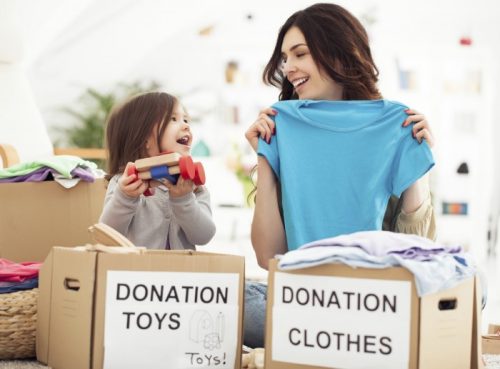It doesn’t matter if you are downsizing or simply looking to purge before you move, there is nothing that feels quite so good. Decluttering before you move is a great way to cut your workload and the cost of movers. The less you have to pack and carry the cheaper your move will be and the more time you will save when it comes time to unpack at your new home. But where do you donate your stuff before you move?
The following examples are some of the best ways to clear the clutter. You will get rid of the items you don’t want or need while helping someone else get the things they need. It’s a great solution and it’s easy too.
Where to donate your stuff before you move
Thrift stores
There are hundreds, maybe thousands of these stores across the country and any of them would do. You can often donate clothes, electronics, and even household items like old but still functioning vacuums or even dishes.
Some thrift stores offer free pickups as well, though you will need to do a little research to find out which offers that service in your area.
Libraries
If you have a ton of books that you don’t want to lug to your new home only to have to unpack and organize, consider donating to your local library. Tons of libraries will not just accept gently worn, pre-owned books but they will also take DVDs and CDs.
Office clothing charities
Many cities have charities that work to provide gently worn work clothes like suits and dresses to workers who can’t quite afford their own new outfits, shoes, jewelry, or accessories. This is a great way to give back to those in need who are trying to get their life back on track.
eBay Giving Works
If you like selling things on eBay, you’re in luck because their Giving Works program makes it super easy to donate to charities. Just auction your items through the program and then donate a percentage of the final sale to the charity of your choosing.
Food Bank
One of the most annoying things to pack and move is food and some movers won’t even deal with it. If you want to unload your food before you move, donate it to the food bank. Any canned or dry goods can be donated and you will be helping feed families in need.
Salvation Army
Donating to the Salvation Army Family Stores allows you to directly help people struggling with addiction get over their troubles and turn their lives around. The money made off of your donations will go to their adult rehabilitation centers.
They accept clothes, furniture, household goods, and appliances.
If you are still in the planning phase of moving, give Let’s Get Moving a call today, we can help.


















